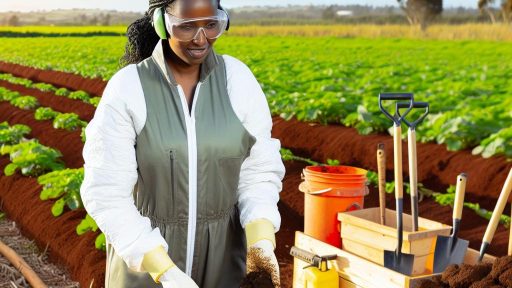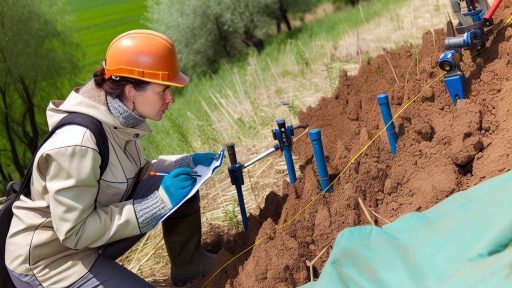Introduction to Soil Microorganisms and Their Roles in Ecosystems
Soil microorganisms are vital for maintaining healthy ecosystems.
These tiny organisms include bacteria, fungi, and protozoa.
They play essential roles in nutrient cycling and decomposition.
Additionally, they help break down organic matter.
This process enriches the soil, promoting plant growth.
Moreover, soil microorganisms enhance soil structure and texture.
This improvement increases water retention and aeration.
Thus, plants can more easily access nutrients and water.
The Diversity of Soil Microorganisms
Soil hosts a vast array of microorganisms, each with unique functions.
Bacteria dominate in terms of abundance and diversity.
They are crucial for nitrogen fixation and organic matter decomposition.
Fungi contribute significantly to nutrient cycling as well.
Moreover, mycorrhizal fungi form symbiotic relationships with plants.
These fungi enhance nutrient absorption through their extensive networks.
The Benefits of Soil Microorganisms
Healthy soil microorganisms contribute to overall soil health.
Transform Your Agribusiness
Unlock your farm's potential with expert advice tailored to your needs. Get actionable steps that drive real results.
Get StartedThey promote plant growth by facilitating nutrient availability.
Additionally, they suppress soil-borne pathogens effectively.
This biological control reduces the need for chemical pesticides.
Furthermore, they improve soil structure, which supports root development.
Microorganisms and Permaculture Practices
In permaculture, fostering soil microorganisms is a primary goal.
Practices such as composting enhance microbial populations.
Crop rotation encourages biodiversity and protects soil health.
Mulching can create a suitable environment for microorganisms.
These practices promote resilience and reduce dependency on external inputs.
Challenges Faced by Soil Microorganisms
Many factors threaten the health of soil microorganisms.
Overuse of chemical fertilizers can disrupt microbial communities.
Soil erosion and compaction also negatively impact these organisms.
Moreover, climate change poses additional stress to soil ecosystems.
Maintaining healthy soil requires awareness and proactive management.
The Diversity of Soil Microorganisms: Bacteria, Fungi, and Protozoa
Bacteria: The Unsung Heroes
Bacteria play a crucial role in soil health.
They contribute to nutrient cycling and organic matter decomposition.
These microorganisms help break down complex compounds into simpler nutrients.
Additionally, some bacteria can fix atmospheric nitrogen, enriching the soil.
In a permaculture system, diverse bacterial communities enhance plant growth.
Fungi: The Network Builders
Fungi form extensive networks within the soil.
They create mycorrhizal associations with plant roots, aiding in nutrient absorption.
This relationship is vital for plant health, especially in nutrient-poor soils.
Fungi also decompose organic materials, returning nutrients to the ecosystem.
Moreover, they help improve soil structure by binding particles together.
Showcase Your Farming Business
Publish your professional farming services profile on our blog for a one-time fee of $200 and reach a dedicated audience of farmers and agribusiness owners.
Publish Your ProfileProtozoa: The Soil Grazers
Protozoa are single-celled organisms that graze on bacteria and organic matter.
By doing so, they help regulate bacterial populations in the soil.
They also release nutrients back into the soil through their waste products.
This process increases nutrient availability for plants.
In permaculture systems, protozoa support a balanced soil ecosystem.
The Interconnected Roles of Soil Microorganisms
Each group of microorganisms plays a unique role in supporting soil health.
Together, they contribute to a thriving ecosystem in permaculture farms.
This diversity promotes resilience against diseases and pests.
Healthy soil microbiomes lead to improved crop yields and sustainability.
Therefore, understanding these vital players is essential for successful permaculture.
How Soil Microorganisms Enhance Soil Fertility and Nutrient Availability
The Role of Soil Microorganisms
Soil microorganisms play a crucial role in maintaining soil fertility.
They break down organic matter, releasing nutrients back into the soil.
Moreover, they create a rich environment for plant growth.
Types of Beneficial Microorganisms
Different types of microorganisms contribute to soil health.
Bacteria are key players in nutrient cycling.
Fungi contribute to the decomposition of organic material.
Additionally, arbuscular mycorrhizal fungi enhance nutrient uptake in plants.
Enhancing Nutrient Availability
Microorganisms help convert nutrients into forms that plants can absorb.
For example, bacteria fix nitrogen from the atmosphere.
In this process, they transform nitrogen into ammonium.
Consequently, plants can utilize this essential nutrient.
Soil Structure Improvement
Microbial activity also improves soil structure.
Soil aggregates form due to the binding properties of microorganisms.
These aggregates enhance aeration and water retention.
As a result, plants develop stronger root systems.
Building Soil Resilience
Healthy populations of soil microorganisms build resilience against pests and diseases.
This occurs through complex interactions with plants and other organisms.
Diverse microbial life contributes to a balanced ecosystem.
You Might Also Like: A Comprehensive Overview Of Sustainable Farm Audits And Certification Prep
The Role of Soil Microorganisms in Decomposition and Organic Matter Breakdown
Introduction to Soil Microorganisms
Soil microorganisms are essential for healthy ecosystems.
They play a key role in breaking down organic matter.
By doing so, they recycle nutrients back into the soil.
Importance of Decomposition
Decomposition is crucial for soil fertility.
It involves the breakdown of plant and animal remains.
This process returns nutrients to the soil for future crops.
Microorganisms ensure this cycle continues smoothly.
Types of Soil Microorganisms
Various types of microorganisms contribute to decomposition.
Bacteria are the most abundant and diverse microorganisms.
They efficiently decompose complex organic substances.
Fungi also play a critical role in breaking down organic matter.
Showcase Your Farming Business
Publish your professional farming services profile on our blog for a one-time fee of $200 and reach a dedicated audience of farmers and agribusiness owners.
Publish Your ProfileThey help decompose tough plant materials like cellulose.
Benefits of Microorganisms in Nutrient Cycling
Microorganisms enhance nutrient availability in the soil.
As they decompose organic matter, they release essential nutrients.
These nutrients include nitrogen, phosphorus, and potassium.
Permanently increasing soil fertility leads to healthier plants.
Promoting Soil Health Through Microorganism Activity
Healthy soil contains a diverse range of microorganisms.
Diversity improves soil structure and aeration.
Microorganisms also create organic compounds that bind soil particles.
This leads to better water retention and drainage.
Encouraging Beneficial Microorganisms
Farmers can promote microorganisms by using compost.
Cover crops provide additional organic matter for decomposition.
Avoiding synthetic fertilizers helps maintain microbial diversity.
Creating habitats for beneficial microorganisms boosts soil health.
Implications of Soil Microorganisms for Sustainable Farming
Understanding the role of soil microorganisms is essential for permaculture.
Fostering these organisms leads to a thriving, healthy farm ecosystem.
Gain More Insights: Renewable Resource Utilization for Small-Scale Farmers
Microbial Symbiosis with Plants
Mycorrhizal Fungi
Mycorrhizal fungi form mutually beneficial relationships with plant roots.
These fungi extend the root system, increasing nutrient absorption.
Specifically, they enhance the uptake of phosphorus and other essential minerals.
In return, plants provide carbohydrates to the fungi, supporting their growth.
This symbiosis improves soil structure and health.
Healthy soil supports a robust ecosystem, benefiting all farm inhabitants.
Research shows that mycorrhizal networks can connect different plants.
This connectivity enhances resilience against drought and disease.
Farmers can promote mycorrhizal activity through organic practices.
For instance, reducing chemical fertilizers fosters these beneficial fungi.
Nitrogen-Fixing Bacteria
Nitrogen-fixing bacteria are essential for sustainable agriculture.
They convert atmospheric nitrogen into forms plants can use.
This process enriches the soil, reducing the need for synthetic fertilizers.
Common nitrogen-fixing partners include legumes like clover and beans.
Incorporating these plants into crop rotations improves soil health.
Furthermore, these bacteria enhance nitrogen availability for entire ecosystems.
Moreover, they support plant growth and increase crop yields.
Farmers can encourage nitrogen-fixing bacteria by maintaining soil health.
Practices such as no-till farming protect these vital microorganisms.
Creating a diverse planting scheme also promotes their development.
Gain More Insights: Sustainable Beef Cattle Farming Methods for Eco-Friendly Ranching
Soil Microorganisms and Pest Management
The Role of Microorganisms in Pest Control
Soil microorganisms play a vital role in managing pests naturally.
They contribute to a healthy ecosystem on the farm.
Beneficial bacteria and fungi help suppress harmful pests and diseases.
Showcase Your Farming Business
Publish your professional farming services profile on our blog for a one-time fee of $200 and reach a dedicated audience of farmers and agribusiness owners.
Publish Your ProfileFor example, certain bacteria release substances toxic to specific pests.
This natural method reduces the need for chemical pesticides.
Enhancing Biodiversity
Diverse microorganisms promote a balanced soil environment.
This diversity can deter pest outbreaks effectively.
Establishing a variety of microorganisms creates disease resistance in plants.
Healthier plants are more capable of fending off pests.
Enhancing Soil Health
Healthy soil is fundamental for thriving plants.
Microorganisms break down organic matter, enriching the soil.
They improve soil structure and promote better water retention.
These qualities lead to stronger, more resilient crops.
Implementing Integrated Pest Management
Integrating microorganisms into pest management strategies is effective.
This approach combines biological controls with other methods.
Farmers can apply beneficial microorganisms to combat pests directly.
Monitoring the soil ecosystem enhances overall farm health.
Case Studies and Success Stories
Many farmers have successfully implemented microbial pest control.
For example, the Johnson family farm reduced pest levels by 75%.
They inoculated their soil with specific beneficial fungi.
Results showed less dependency on chemical treatments.
Such success stories inspire other farmers to adopt similar practices.
Uncover the Details: Renewable Resource Utilization to Improve Farm Profitability

Impacts of Soil Management Practices on Microbial Health and Diversity
Understanding Soil Management
Sole management practices directly influence microbial populations.
Healthy practices can enhance microbial diversity.
Conversely, poor management can lead to declines in biodiversity.
Organic vs. Conventional Practices
Organic practices often promote healthier soil ecosystems.
They typically introduce beneficial microorganisms into the soil.
In contrast, conventional methods may harm soil biodiversity.
For example, synthetic fertilizers can reduce microbial variety.
The Role of Composting
Composting enriches the soil with diverse microorganisms.
This process enhances soil structure and nutrient availability.
Furthermore, it supports a healthy microbial community.
The Impact of Tillage
Tillage practices affect soil microbial health significantly.
Reduced tillage often preserves microbial habitats.
It also minimizes soil erosion and improves moisture retention.
Importance of Cover Crops
Planting cover crops can enhance microbial diversity.
These crops provide organic matter to the soil.
As a result, they support beneficial microbial populations.
Monitoring Soil Health
Regular soil testing helps assess microbial activity.
This practice allows farmers to adjust their management strategies.
In doing so, they can enhance soil health and productivity.
The Importance of Soil Microorganisms in Carbon Sequestration and Climate Regulation
The Role of Microorganisms in Carbon Sequestration
Soyl microorganisms play a crucial role in carbon sequestration.
Showcase Your Farming Business
Publish your professional farming services profile on our blog for a one-time fee of $200 and reach a dedicated audience of farmers and agribusiness owners.
Publish Your ProfileThey help in breaking down organic matter, converting it into stable forms of carbon.
This process stores carbon in the soil, reducing atmospheric CO2 levels.
Consequently, healthy soils contribute to climate regulation.
Moreover, microorganisms enhance soil structure and stability.
This leads to more efficient water retention and nutrient availability.
How Microbial Activity Influences Climate Regulation
Microbial activity significantly influences climate regulation processes.
For example, they regulate greenhouse gas emissions through decomposition.
This includes the conversion of organic materials into soil organic matter.
Such processes mitigate the release of harmful gases like methane.
In addition, diverse microbial communities strengthen ecosystem resilience.
Healthy ecosystems can better adapt to climate extremes.
Enhancing Soil Health Through Microorganisms
Maintaining soil health is vital for effective carbon sequestration.
Healthy soils support diverse microbial populations.
This increases the overall efficiency of nutrient cycling.
Furthermore, improving soil biodiversity enhances plant growth.
As a result, more plants can contribute to carbon capture.
Strategies to Promote Soil Microorganism Activity
Farmers can implement various strategies to promote soil microorganisms.
- Practice crop rotation to enhance biological diversity.
- Utilize cover crops to protect and enrich the soil.
- Avoid excessive pesticide and fertilizer use to maintain microbial balance.
- Incorporate organic matter like compost to stimulate microbial activity.
These practices not only improve soil health but also support climate regulation.
Encouraging Healthy Microbial Communities for Sustainable Permaculture Farming
The Role of Microorganisms in Soil Health
Soil microorganisms play a vital role in maintaining soil health.
They contribute to nutrient cycling in the soil ecosystem.
Through decomposition, these organisms break down organic matter.
This process releases essential nutrients for plants.
Microbes also help in soil structure formation.
Healthy soil structure enhances water retention and aeration.
In addition, beneficial microorganisms suppress soil-borne diseases.
Enhancing Microbial Diversity
Diverse microbial communities promote resilience in farming systems.
Diversity is crucial for effective nutrient cycling and disease resistance.
Planting a mix of crops fosters a variety of microbes.
Cover crops also assist in building microbial populations.
These practices create a dynamic soil environment.
Innovative practices like mulching can enhance microbial life.
Incorporating organic matter encourages diverse microbial habitats.
Implementing Sustainable Practices
Adopting sustainable farming practices boosts microbial health.
Organic farming techniques minimize chemical use.
These methods support the growth of beneficial microorganisms.
Additionally, crop rotation prevents nutrient depletion and pest issues.
Limiting tillage preserves soil structure and microbial communities.
Using natural fertilizers fosters microbial activity in the soil.
Monitoring Soil Health
Regular soil testing helps track microbial health over time.
Farmers can identify nutrient deficiencies or toxicities promptly.
Showcase Your Farming Business
Publish your professional farming services profile on our blog for a one-time fee of $200 and reach a dedicated audience of farmers and agribusiness owners.
Publish Your ProfileUtilizing soil amendments can restore balance effectively.
Furthermore, monitoring microbial populations can guide farming decisions.
Implementing practices based on data enhances overall farm productivity.
Fostering Community Engagement
Involving the community can support sustainable farming initiatives.
Sharing knowledge about microbial importance boosts awareness.
Local workshops can provide training on enhancing soil health.
Community gardens can serve as practical examples for farmers.
Collaboration fosters innovation in permaculture practices.
Building a network strengthens sustainable farming movements.
Encouraging healthy microbial communities is essential.
Sustainable practices promote vitality and resilience in permaculture farming.
Emphasizing diversity and monitoring soil health leads to success.
Community engagement further supports the desired outcomes.
These efforts can create thriving, sustainable farming systems.
Additional Resources
Soil Building – How to Make Deep Rich Soils by Imitating Nature …
Role of organic farming for achieving sustainability in agriculture …




